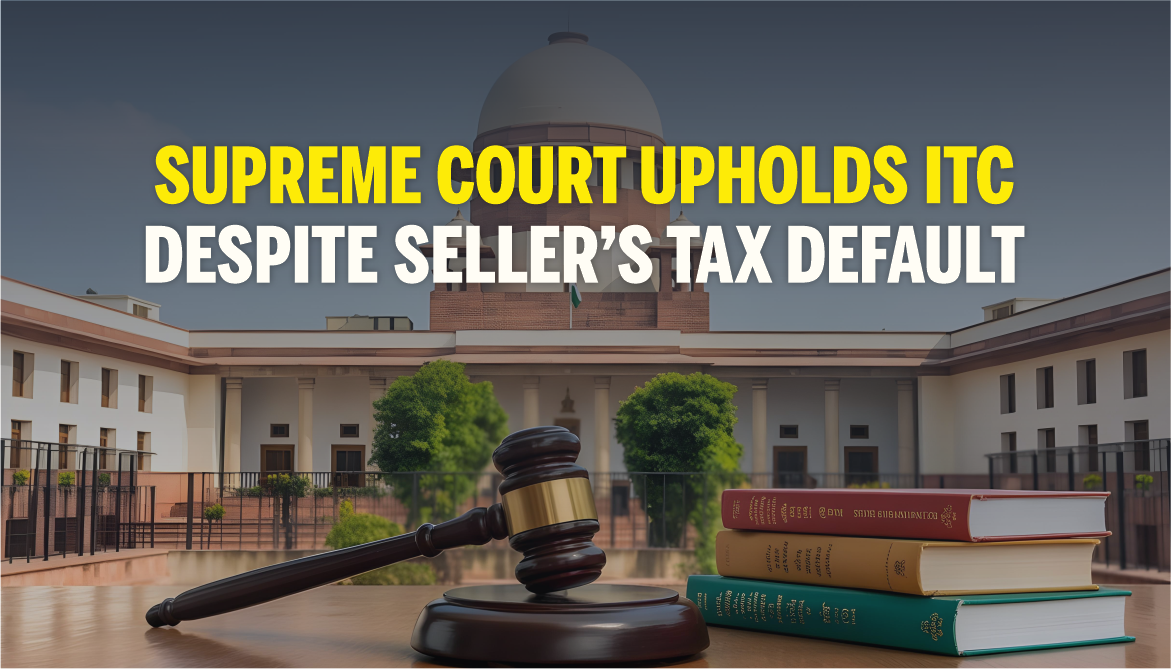Supreme Court Upholds ITC Despite Seller’s Tax Default

In a significant ruling that may reshape the contours of indirect tax litigation, the Supreme Court of India has upheld the entitlement of Input Tax Credit (ITC) to registered purchaser-dealers under the Delhi VAT regime, even in cases where the selling dealer failed to deposit the collected tax. Though the dispute arose under the pre-GST VAT law, the judgment’s principles hold critical implications for current and future GST jurisprudence.
The Case: Background and Legal Dispute
The case involved a set of registered purchaser-dealers who had procured goods from registered selling-dealers and paid VAT as per valid tax invoices. However, the selling dealers subsequently failed to deposit the tax with the Government and were eventually deregistered. The Revenue sought to deny ITC to the purchasers on the grounds that the tax never reached the exchequer.
The Delhi High Court had earlier ruled in favour of the purchasers, directing that ITC could not be denied if the purchasing dealer had acted in good faith and fulfilled all legal formalities. The Tax Department appealed the decision before the Supreme Court, contending that ITC is not a vested right if the corresponding tax has not been paid by the seller.
The Supreme Court’s Verdict: Affirming Principles of Fairness
A Division Bench comprising Justices Manoj Misra and N. Kotiswar Singh dismissed the Revenue’s appeal. In unequivocal terms, the Court held:
“There is no dispute regarding the selling dealer being registered on the date of transaction… and neither the transactions nor invoices in question have been doubted… We do not find a good reason to interfere with the order of the High Court… The appeals lack merit and are, accordingly, dismissed.”
This verdict affirms the High Court’s reasoning that genuine purchasers should not be penalised for non-compliance by the seller—particularly in the absence of any fraud or collusion.
Legal Underpinnings: VAT and GST Comparisons
Under the Delhi VAT Act, the Revenue had relied on Section 9(2)(g), which allows disallowance of ITC if tax is not deposited by the seller. However, courts have consistently interpreted this provision to require a nexus of fraud, collusion, or willful misstatement to disallow ITC for purchasers.
A similar debate persists under GST. Section 16(2)(c) of the CGST Act, 2017, makes the availment of ITC contingent upon actual payment of tax to the Government by the supplier. This provision has become a fulcrum for disputes, especially in cases where a bona fide purchaser is denied credit merely due to defaults by the supplier.
Precedents and Parallel Judgments
This is not the first case where courts have questioned the denial of ITC to bona fide recipients:
-
Quest Merchandising India Pvt. Ltd. (Delhi HC): Held that ITC cannot be denied to a genuine buyer if the seller fails to deposit tax, provided there is no fraud or connivance.
-
Ecom Gill Coffee Trading Pvt. Ltd. (SC): The apex court laid down that the burden is on the purchasing dealer to prove the genuineness of the transaction and movement of goods.
-
D.Y. Beathel Enterprises (Madras HC): Criticised the department for not taking action against the defaulting seller and arbitrarily targeting the buyer.
-
Suncraft Energy & Lokenath Construction (Calcutta HC): Quashed tax demands on recipients where no investigation was conducted on the supplier’s end.
These judgments reflect an evolving jurisprudence where courts are increasingly upholding the rights of compliant taxpayers against arbitrary departmental action.
Legislative Response: Post-Facto ITC Relief
Recognising the complexities in retrospective compliance, the legislature amended Section 16(4) via the Finance Act, 2024, to allow ITC claims for FYs 2017–18 to 2020–21 until 30th November 2021. This amendment acknowledges the systemic delays and verification challenges faced by genuine taxpayers.
Implications for GST Litigation
While the Supreme Court ruling technically pertains to VAT law, it underscores a key tenet of tax jurisprudence: no taxpayer should suffer for the fault of another, provided due diligence is exercised.
For GST stakeholders, the judgment bolsters the following positions:
-
Challenging Section 16(2)(c): The validity and proportionality of making ITC dependent on the supplier’s conduct may be subject to constitutional scrutiny.
-
Doctrine of Legitimate Expectation: A taxpayer who acts on government-issued invoices from a registered dealer is justified in expecting credit.
-
Due Diligence Defence: Taxpayers must retain robust documentation—purchase orders, invoices, goods receipt notes, payment proofs—to defend their bona fides.
-
Push for GSTR-2A Reconciliation Reform: The judgment may prompt policy reform to allow recipients to avail ITC based on supplier compliance certification, not actual tax deposit.
Policy and Industry Impact
This ruling sends a strong message to tax authorities to act judiciously and not penalise honest taxpayers for systemic lapses. It also nudges the Government towards refining its compliance architecture under GST to balance revenue interests with taxpayer rights.
Moreover, corporates should revisit their vendor management protocols, focusing not just on invoice verification but also on assessing supplier compliance history—preferably through contractual indemnity clauses or rating systems.
Conclusion: A Watershed in Credit Entitlement Jurisprudence
The Supreme Court’s decision is a milestone in asserting that ITC is a legal right subject to compliance, not a mere concession. While vigilance remains crucial, the judgment lays a robust foundation for challenging similar denials under the GST regime. As the nation continues to navigate the post-GST litigation landscape, this verdict may emerge as a cornerstone in reinforcing the integrity of tax credit systems and protecting bona fide taxpayers from unjust liabilities.
